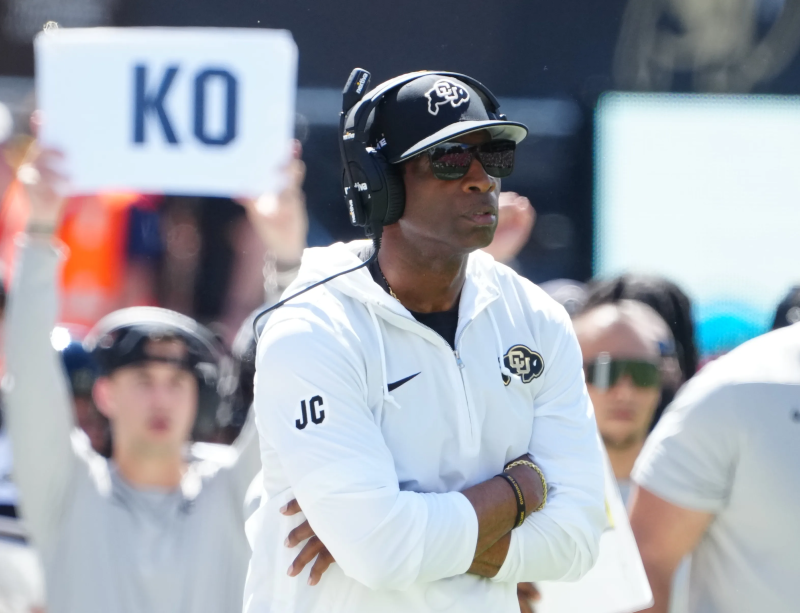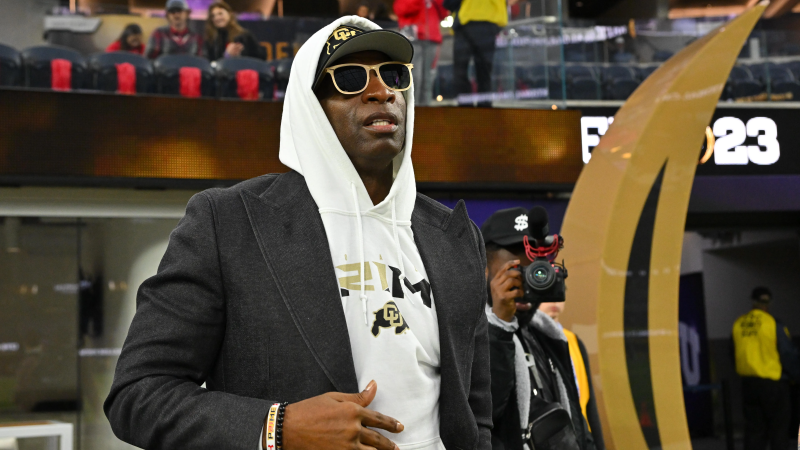'The biggest story in sports:' Colorado chancellor talks Deion Sanders, league realignment
BOULDER, Colorado – Phil DiStefano has had quite a year as chancellor of the University of Colorado Boulder.
Since early December, he has:
∎ Hired Deion Sanders as his university’s new head football coach.
∎ Decided to have Colorado leave the Pac-12 Conference after 13 years, helping contribute to the league’s collapse.
∎ Decided to rejoin the Big 12 Conference after leaving it in 2011.
∎ More recently, he’s watched his university’s football team become arguably the biggest story in American sports after starting the season 2-0 under Sanders, including a big win against Nebraska Saturday at Folsom Field.
USA TODAY Sports interviewed him about all of this and more in his office on campus the day before that home opener.

Is Colorado putting too many eggs in Sanders’ basket? Does he view Colorado’s time in the Pac-12 as a big mistake? Didn’t the league’s presidents and chancellors turn down a good deal last year that could have kept the league together? And why did he pull the plug on the Pac-12 before he even knew for sure what the league could offer Colorado in revenue-sharing for the future?
"I could have been wrong," DiStefano said.
To be clear, sports is not his primary focus. He’s a lifelong educator who has been in charge of the campus as chancellor since 2009, including athletics. But the Buffaloes have grabbed national headlines recently, leading both ESPN and Fox Sports to send their Saturday game day shows to Boulder this week. “60 Minutes” is coming to town, too, according to a recent video published by Sanders’ son Deion Jr. All want to capitalize on the big viewership numbers being delivered by "Coach Prime" after he took over a team that finished 1-11 last year.
Colorado's big bet on Sanders: 'Why not?'
Before the season, the university even filmed a nationally televised commercial that promotes CU Boulder by showcasing it as a “Prime” destination with “Coach Prime” on board. DiStefano appears in the ad at the end, noting the campus has a “Prime location” with its scenic backdrop.
But there were no guarantees Sanders would be successful when they filmed this advertisement for the university. He hadn't even coached a game yet. Skeptics might question whether Colorado has placed too many eggs in Sanders’ basket, which could fall and break in an unpredictable sport.
DiStefano sees it differently.
"Yeah, I think for this first year, why not?" DiStefano said. "I mean, it’s the biggest story in sports, not only in college sports. In sports. So why not?"
Why they ditched the Pac-12
DiStefano and his athletic director, Rick George, had decided they couldn’t wait forever on the Pac-12 to give them concrete projections for what the league could provide them in revenue under a new media rights deal starting next year.
So they bailed and signed a grant-of-rights agreement with the Big 12 that lasts through June 2031.
He previously told USA TODAY Sports he would wait to see the numbers from the Pac-12 before making any decision and even expressed confidence that the Pac-12 would rank third among the Power 5 conferences in revenue sharing.
All that changed in July, when Colorado faced a decision: Take a concrete offer from the Big 12 to join as a full member with a $31.7 million share of media rights revenue. Or keep waiting on the Pac-12 to show them the money.
"I was chancellor when we moved to the Pac-12 (in 2011), and it was one of the things I wanted to do, but personally I couldn’t see a deal in the Pac-12 coming through of any significance," he said. "I could have been wrong."
Did he see any numbers from the Pac-12 before deciding to leave?
"Actually, I didn’t," he said.
Wasn't it a risk to leave before then?
He said he could have been wrong because there was still a possibility the Pac-12 could strike a deal with a major television partner such as ESPN. It did not, but DiStefano didn’t know that for sure at the time that he made the decision to leave. All he knew for sure was that the Big 12 was offering a TV package with ESPN and Fox Sports.
"What we knew was what the Big 12 could offer and that ESPN could pick up any, if it’s a Power 5 conference team, their share," he said. "And Fox, it would be negotiated with the Big 12. And we were confident about that just because it was Colorado and having Coach Prime (Sanders)."
What did he know at the time about the Pac-12?
After Colorado decided to leave the Pac-12, the league showed remaining members a potential deal with Apple that would stream Pac-12 games on its subscription service. It was unconventional and raised questions about whether the league’s schools would lose visibility if they moved away from traditional linear TV companies such as ESPN. Did DiStefano know at the time that the Pac-12 deal would not focus on linear TV?
"Well, no, because I believed there were still discussions going on with linear," he said. "But I think that’s where the risk (for Colorado) might have come in. But again, I think the stability outweighed the risk."
The cost of realignment
Stability was the main reason Colorado left the Pac-12. After Colorado left, Arizona, Arizona State and Utah made the same decision to ditch the uncertain future of the Pac-12 for certain linear contract terms with the Big 12.
Washington and Oregon also decided to leave the Pac-12 for the Big Ten, forcing their athletes into a series of cross-country trips to Big Ten destinations in the Midwest and East instead of shorter trips in the West with the Pac-12. Similar long-distance travel awaits California and Stanford, which since decided to bail on the Pac-12 for the Atlantic Coast Conference based in North Carolina.
"It’s definitely going to be difficult on student-athletes," DiStefano said of those schools. "Personally, what I would hope is the presidents and chancellors in the ACC and Big Ten, and athletic directors in those two conferences, really look at some creative scheduling so that these students aren’t flying to Rutgers one weekend and flying back to Indiana or Ohio State the second one."
Colorado doesn’t face that problem by rejoining the Big 12, because DiStefano said its travel distances won’t change much.
What do you think of the Pac-12's demise?
Only two Pac-12 teams remain for 2024: Oregon State and Washington State.
"It’s confirmation of how college sports are changing," he said.
Is it progress?
"Probably progress in some ways," he said. "In some ways, kind of in the middle."
Progress in that sense could be defined as stability for Colorado and massive revenue increases for those joining the Big Ten next year, included Southern California and UCLA, whose revenue shares will roughly double from what they were getting in the Pac-12 to about $70 million.
This money comes from TV companies, especially Fox Sports.
"TV is obviously running the show," DiStefano said. "And that’s how it is."
ESPN reportedly offered the Pac-12 schools $30 million each last year to stay together in a new media rights deal.
What about that ESPN offer?
"I read the same thing," he said. "To be honest, I don’t’ remember being offered $30 million from ESPN. I really don’t."
Would that ESPN offer have made a difference?
"If it happened, and we looked at it, it could have made a difference," he said. "I go to all the (Pac-12) meetings (but don’t remember it)."
Who's to blame for what happened to the Pac-12?
"I’m not in the blame game at all," he said. "The presidents and chancellors in this case, No. 1 they do what’s good for their institutions. And I don’t know (USC president Carol Folt’s) motivation or (UCLA chancellor) Gene Block’s motivation. My motivation was stability for our student-athletes, making sure they had the opportunity to be on ESPN, Fox. That’s how I looked at it."
Was it a mistake for Colorado to join the Pac-12 in 2011?
Colorado’s football team, the cash cow of its athletics department, has been mostly terrible in the Pac-12. Its record in the league in the past 12 years is 27-76. It has had only two winning seasons in that time, including the pandemic-shortened season of 2020. In 2016, it won the South Division of the league in football but last year hit bottom again.
"I don’t think it was a mistake," DiStefano said.
Why not?
"There were key visits and meetings with alumni in Southern California, parents of students - that’s our largest state for out-of-state students," he said. "That helped on the fundraising side. To give you an example, when I became chancellor in 2009, we were raising about $86 or 87 million a year. After we joined the Pac-12, it’s up to $120, 150 (million) … We had one year of over $200 (million). That was a key area."
Won’t that dry up by moving to the Big 12?
"The reason I don’t think it does is we’ve really tried to cement relationships in Southern California, Northern California, those areas," he said. "Plus, obviously, unless if we added teams if we stayed in the Pac-12, and we added teams for Southern California … with UCLA and USC leaving, that was huge (as a loss for Colorado)."
One reason their departures hurt Colorado is because he said pregame events at USC and UCLA would draw around 2,000 of CU fans and alumni, which helps drive engagement and donations.
Can Colorado realistically bring back its baseball team?
Coach Prime said he wants to increase revenue enough to make it happen. The program was disbanded to cut costs in 1980, along with other sports.
"I have no idea," DiStefano said. "There are a lot of sports. Baseball. We gave up wrestling. We gave up swimming. I think it’s up to the AD if we are going to add, what are the priorities?"
What else should we know?
"Just see how things go tomorrow (Saturday)," he said. "That’s what’s on my mind … It’s going to be wild, yeah."
Colorado beat Nebraska that day, 36-14 in front of 53,241. It was Colorado’s largest home football crowd since 2008.
Follow reporter Brent Schrotenboer @Schrotenboer. Email: bschrotenb@usatoday.com

Disclaimer: The copyright of this article belongs to the original author. Reposting this article is solely for the purpose of information dissemination and does not constitute any investment advice. If there is any infringement, please contact us immediately. We will make corrections or deletions as necessary. Thank you.







